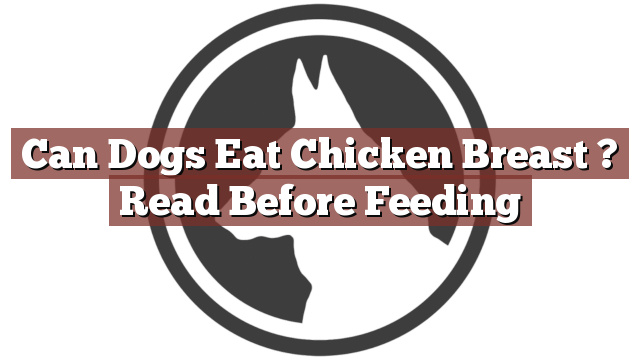Understanding Your Dog’s Dietary Needs
As pet owners, it is crucial to understand our furry friends’ dietary needs to ensure their overall health and well-being. Dogs are omnivores, which means they can consume both meat and plant-based foods. However, their nutritional requirements differ from humans, and some human foods may not be suitable for them. It is important to research and consult with a veterinarian before introducing any new food into your dog’s diet.
Can Dogs Eat Chicken Breast? Read Before Feeding
One common question that arises is, "Can dogs eat chicken breast?" The short answer is yes, dogs can eat chicken breast. In fact, chicken is a common ingredient in many commercial dog foods and is often recommended by veterinarians. It is a lean source of protein that offers various health benefits for our furry friends.
Pros and Cons of Feeding Chicken Breast to Dogs
Feeding chicken breast to dogs has several advantages. Firstly, it is a great source of protein that helps build and repair muscles, supports the immune system, and aids in digestion. Chicken breast is also low in fat, making it ideal for dogs that require a low-fat diet. Additionally, it contains essential amino acids, vitamins, and minerals that contribute to overall canine health.
However, it is important to note that there are a few potential drawbacks to feeding chicken breast to dogs. Some dogs may have allergies or sensitivities to chicken or poultry, resulting in digestive issues or skin irritations. Furthermore, chicken breast should always be cooked thoroughly to eliminate any harmful bacteria, such as salmonella, that can be detrimental to your dog’s health. Lastly, chicken breast should be served plain without any seasoning, as certain spices and additives can be toxic to dogs.
In Conclusion: Considerations for Feeding Chicken Breast to Dogs
In conclusion, dogs can eat chicken breast, and it can be a healthy addition to their diet. However, it is essential to consider a few factors before feeding chicken breast to your furry friend. Always consult with your veterinarian to ensure that your dog does not have any allergies or sensitivities to chicken. Cook the chicken thoroughly to eliminate any potential bacteria, and avoid adding any seasonings or additives. By following these guidelines and considering your dog’s individual dietary needs, you can safely incorporate chicken breast into their meals for a balanced and nutritious diet.
Thank you for taking the time to read through our exploration of [page_title]. As every dog lover knows, our furry friends have unique dietary needs and responses, often varying from one canine to another. This is why it's paramount to approach any changes in their diet with caution and knowledge.
Before introducing any new treats or making alterations to your dog's diet based on our insights, it's crucial to consult with a veterinarian about [page_title]. Their expertise ensures that the choices you make are well-suited to your particular pet's health and well-being.
Even seemingly harmless foods can sometimes lead to allergic reactions or digestive issues, which is why monitoring your dog after introducing any new food item is essential.
The content provided here on [page_title] is crafted with care, thorough research, and a genuine love for dogs. Nevertheless, it serves as a general guideline and should not be considered a substitute for professional veterinary advice.
Always prioritize the expert insights of your veterinarian, and remember that the health and happiness of your furry companion come first.
May your journey with your pet continue to be filled with joy, love, and safe culinary adventures. Happy reading, and even happier snacking for your canine friend!

